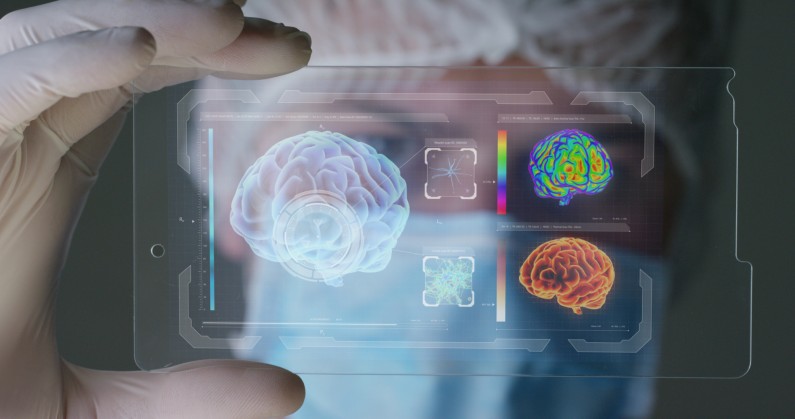Covid-19 has changed the health system, but the upheaval goes much deeper than mere digitisation, telemedicine or the electronic exchange of patient records. The entire health system will tick differently after the crisis than before – from the clinic director down to the patient. 2020 has triggered developments that will significantly shape 2021 and the years after. With all the uncertainties that come with foresight in times of a pandemic, here are the five big health tech trends in 2021 presented by our Unit Director Health Tech Robert Thielicke, former Editor-in-Chief of the MIT Technology Review, a renowned science magazine.

Artificial intelligence reaches diagnosis Artificial Intelligence (AI) has long been considered a hope for medicine. No surprise, after all, as the medical field often involves large amounts of data that push even experts to the breaking point – if they manage to work through it at all. In 2021, they will finally get help. With Vara.ai from Berlin and Therapixel from France, two start-ups that are working on using AI to diagnose diseases. The technology helps in the early detection of breast cancer by having the computer scan the respective ultrasound images for characteristic tissue changes – quite successfully. Numerous studies have now shown that AIs perform significantly better than radiologists in routine cases: AIs do not get tired or unfocused. After initial practical tests, the medical AI will arrive on a broad front in Germany next year and assist doctors with thousands of women. We will see the first practices “powered by AI”. The next step is likely to be the adaptation to other radiology fields, and then pathology. So far, specialists in clinics and medical laboratories analyse tissue samples for signs of disease. This, too, can be automated to a large extent. From there, the technology will gradually penetrate many other medical fields. Digital Health heralds the end of central data storage Until now, the rule has been: data must be available in a central location in order to be able to evaluate it in a meaningful way. This idea is followed by the electronic patient record ePA, which starts on 1st January. But the larger the data pool and the more sensitive the information stored in it, the greater the risk of misuse. When it comes to health, hardly anyone will want to take this risk – which is why the ePA will not be the success that politicians hope it will be. So we need something new. In 2021, precisely this new thing will become the big issue: distributed data storage. The Corona warning app has shown that this is possible: instead of being stored in a central location, the data is stored on the users’ mobile phones and is only merged when a risk encounter occurs. The digital agency Turbine Kreuzberg already relies on this principle and thus has developed a decentralised electronic patient file. The medical history is only merged from different sources when the doctor needs it, and only if the patient agrees. GAIA-X, the EU’s cloud project, is also driving forward the decentralised data cloud, as is Siemens Healthineers in cooperation with IBM. Evaluations for AI applications, for example, are nevertheless possible. The Berlin start-up Apheris AI shows how: its technology offers the possibility of merging data from, for example, a health insurance company with that of a pharmaceutical company – and without having to exchange the data itself. It creates artificial data that is far enough away from the real thing – but still close enough to enable analysis. This has the additional charm that the owner of the data is involved in the monetisation process – be they patients, clinics or pharmaceutical companies. Last July, Apheris AI raised seven million euros and is already working with its first paying customers.

Google verliert an Boden
Google is losing ground The simple reason: lack of trust, especially in terms of data protection. Instead, if nothing dramatic happens, 2021 will be the year for Amazon and Apple in the health sector. Because Google’s successful “pay with data” business model doesn’t fit when it comes to diseases. And hardly anyone trusts the company that it can also do “service for payment” – especially in the medical field. Consequently, the digital company has repeatedly failed to convince large US providers of so-called electronic health records to use its Google Cloud: Epic, with over 250 million patients in its database, opted for Microsoft, and Cerner, with 200 million patients, for Amazon. Both times data protection concerns were the deciding factor. Amazon is also making inroads in another major health sector: with Amazon Pharmacy, it is entering the pharmacy business. Initially, the service is limited to the US, but in 2021 it could also be available in the first European countries. Apple is also in a good position. The company has recently built up a reputation as a data protector in its consumer business, not least through the new labelling in the App Store showing what data the various apps collect. Together with its end devices, Apple has therefore positioned itself well to play an important role in electronic medical records, digital health apps and, in the future, in the diagnostics sector with wearables. Diagnosis without a doctor’s office Covid-19 has turned millions of people into health experts – and they will remain so even after the pandemic. This has created a huge trend towards health care in the private sphere. The market for simple tests for infections, for example, will grow; the US Food and Drug Administration (FDA) has just approved the first Covid-19 test for private use. This development will not be limited to the Coronavirus. In other areas, too, the doctor’s office is making inroads into the living room: The new models of the Apple Watch, for example, allow the detection of heart rhythm irregularities. Using light reflection, they can detect slight changes in blood flow and thus detect atrial fibrillation at an early stage – an important indication of an impending stroke. The Apple Heart Study conducted by Apple and Stanford University has already shown that atrial fibrillation is actually the cause of 84 percent of the alerts. The Heartline study by the pharmaceutical company Johnson&Johnson is currently underway to determine the benefit for high-risk groups. Another example is the sensor-equipped ScanWatch from the manufacturer Withings. It regularly measures oxygen saturation in the blood and heart function via ECG. The LMU Munich is currently testing it on patients at risk for cardiovascular disease in order to keep hospital beds free in times of Corona. Even beyond Corona, it should be possible to reduce hospital stays in this way in the future. So 2021 will be a decisive year for this area.

The German start-up Wellabe offers companies mobile medical labs where employees can have their health checked. At some point, they will also be located in pharmacies or perhaps even in drugstores, similar to the Minute Clinics in the USA. The era of real early detection Timely therapy is still the best chance of surviving cancer. For years, companies have therefore been researching simple blood tests that can detect tumours in the body at a very early stage. The method behind this is called Liquid Biopy and it would be simply ingenious if it worked. Because the tests recognise genetic material that releases cancer cells, and as soon as the characteristic gene changes are known, it could be applied to a wide variety of tumours. A milestone for this particular technology is coming up in 2021: Grail, bought by gene analysis provider Illumina for eight billion dollars, has announced a partnership with the NHS. The British authority, responsible for the health care of the population on the island, will offer 165,000 patients a corresponding examination from next year. The so-called Galleri blood test is supposed to detect up to 50 types of cancer in their early stages. Numerous other companies are also waiting in the wings. The technology is expected to dramatically improve cancer survival rates worldwide. Robert Thielicke is Unit Director Healthtech at PIABO. He looks back on almost 20 years of editorial experience in technology journalism. Most recently, he was editor-in-chief of the German edition of the renowned innovation magazine MIT Technology Review. If you have any questions or comments, please contact Robert personally.


